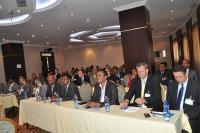The First Healthcare Infrastructure and Pharmaceutical Investment Summit holds in Addis Ababa
WHO works with the Government of Ethiopia to strengthen local pharmaceutical manufacturing and regulatory capacity
Creating access to affordable essential medicines is an integral part of ensuring Universal Health Coverage in developing countries like Ethiopia, and strengthening local pharmaceutical manufacturing capacity is key to this.
Organized to facilitate dialogue between the Ministry of Health and its agencies, pharmaceutical industry, academia and research, the Ethiopia Healthcare Infrastructure & Pharmaceutical Investment Summit was held in Addis Ababa on 24 and 25 September 2014 under the auspices of the Federal Ministry of Health and the Ethiopian Investment Agency. The Summit brought together speakers and participants from the Ministry of Health, the Food, Medicine and Health-Care Administration Authority, Addis Abeba University, Armauer Hansen Research Institute, WHO, the World Bank, professional associations and the private sector.
In his keynote address at the Summit, WHO Representative to Ethopia, Dr Pierre M’pele-Kilebou emphasized that there is no poverty reduction or economic and social development without good health, adding, “Improving the health of the people requires ensuring Universal Health Coverage so that all people access the health services they need – services that are of sufficient quality and quantity.” This is at the core of WHO’s support to Ethiopia’s effort to ensure the health of its people.
Dr M’pele-Kilebou also called attention to the recent joint Editorial by Dr Margaret Chan, Director General of WHO, Mr Michel Sidibé, Executive Director of UNAIDS, and Mr Li Yong, Director General of UNIDO, where the three heads of agencies made a common commitment to strengthen and invest in domestic manufacturing of pharmaceuticals and other health commodities in Africa, and wherein, they agreed to work with the African Union Commission to support countries in the implementation of the Pharmaceutical Manufacturing Plan for Africa that has been unanimously endorsed by the Heads States.
WHO works with the Government of Ethiopia towards strengthening local pharmaceutical manufacturing and regulatory capacity based on needs identified through a rapid assessment of the situation of the local manufacturing industry and an in-depth evaluation of the medicine regulatory system of the country.
WHO also provides technical support in the development of a national pharmaceutical manufacturing development plan, facilitates the pre-qualification of potential products and firms and conducts other capacity-building programs.
It is expected that this will propel Ethiopia towards Millennium Development Goal 8, Target 5, which aims to provide access to affordable essential medicines in developing countries in cooperation with pharmaceutical companies.
For more information, please contact: Mr Abraham Gebregiorgis, Programme Coordinator, Essential Drugs and Medicines, WHO Ethiopia; Email: gebregiorgisa [at] who.int
PHOTOS: WHO Ethiopia/ Loza Mesfin Tesfaye

